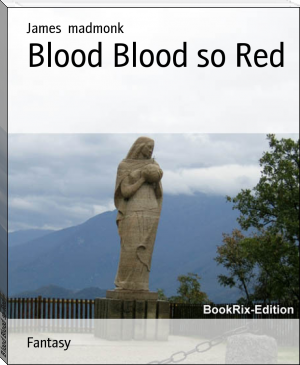Robin Hood by J. Walker McSpadden (best book series to read txt) 📗

- Author: J. Walker McSpadden
Book online «Robin Hood by J. Walker McSpadden (best book series to read txt) 📗». Author J. Walker McSpadden
“Neither the one nor the other will I do,” snarled the Bishop.
“Faith, then we must help you,” said Little John; and he and Arthur-a-Bland seized the fat struggling churchman and commenced to hop up and down. The Bishop being shorter must perforce accompany them in their gyrations; while the whole company sat and rolled about over the ground, and roared to see my lord of Hereford’s queer capers. At last he sank in a heap, fuddled with wine and quite exhausted.
Little John picked him up as though he were a log of wood and carrying him to his horse, set him astride facing the animal’s tail; and thus fastened him, leading the animal toward the highroad and, starting the Bishop, more dead than alive, toward Nottingham.
CHAPTER XVIII HOW THE BISHOP WENT OUTLAW-HUNTING The Bishop he came to the old woman’s house, And called with furious mood, “Come let me soon see, and bring unto me That traitor, Robin Hood.”
The easy success with which they had got the better of the good Bishop led Robin to be a little careless. He thought that his guest was too great a coward to venture back into the greenwood for many a long day; and so after lying quiet for one day, the outlaw ventured boldly upon the highway, the morning of the second. But he had gone only half a mile when, turning a sharp bend in the road, he plunged full upon the prelate himself.
My lord of Hereford had been so deeply smitten in his pride, that he had lost no time in summoning a considerable body of the Sheriff’s men, offering to double the reward if Robin Hood could be come upon. This company was now at his heels, and after the first shock of mutual surprise, the Bishop gave an exultant shout and spurred upon the outlaw.
It was too late for Robin to retreat by the way he had come, but quick as a flash he sprang to one side of the road, dodged under some bushes, and disappeared so suddenly that his pursuers thought he had truly been swallowed up by magic.
“After him!” yelled the Bishop; “some of you beat up the woods around him, while the rest of us will keep on the main road and head him off on the other side!”
For, truth to tell, the Bishop did not care to trust his bones away from the highroad.
About a mile away, on the other side of this neck of woods, wherein Robin had been trapped, was a little tumbledown cottage. ‘Twas where the widow lived, whose three sons had been rescued. Robin remembered the cottage and saw his one chance to escape.
Doubling in and out among the underbrush and heather with the agility of a hare, he soon came out of the wood in the rear of the cottage, and thrust his head through a tiny window.
The widow, who had been at her spinning wheel, rose up with a cry of alarm.
“Quiet, good mother! ‘Tis I, Robin Hood. Where are your three sons?”
“They should be with you, Robin. Well do you know that. Do they not owe their lives to you?”
“If that be so, I come to seek payment of the debt,” said Robin in a breath. “The Bishop is on my heels with many of his men.”
“I’ll cheat the Bishop and all!” cried the woman quickly. “Here, Robin, change your raiment with me, and we will see if my lord knows an old woman when he sees her.”
“Good!” said Robin. “Pass your gray cloak out the window, and also your spindle and twine; and I will give you my green mantle and everything else down to my bow and arrows.”
While they were talking, Robin had been nimbly changing clothes with the old woman, through the window, and in a jiffy he stood forth complete, even to the spindle and twine.
Presently up dashed the Bishop and his men, and, at sight of the cottage and the old woman, gave pause. The crone was hobbling along with difficulty, leaning heavily upon a gnarled stick and bearing the spindle on her other arm. She would have gone by the Bishop’s company, while muttering to herself, but the Bishop ordered one of his men to question her. The soldier laid his hand upon her shoulder.
“Mind your business!” croaked the woman, “or I’ll curse ye!”
“Come, come, my good woman,” said the soldier, who really was afraid of her curses. “I’ll not molest you. But my lord Bishop of Hereford wants to know if you have seen aught of the outlaw, Robin Hood?”
“And why shouldn’t I see him?” she whined. “Where’s the King or law to prevent good Robin from coming to see me and bring me food and raiment? That’s more than my lord Bishop will do, I warrant ye!”
“Peace, woman!” said the Bishop harshly. “We want none of your opinions. But we’ll take you to Barnesdale and burn you for a witch if you do not instantly tell us when you last saw Robin Hood.”
“Mercy, good my lord!” chattered the crone, falling on her knees.
“Robin is there in my cottage now, but you’ll never take him alive.”
“We’ll see about that,” cried the Bishop triumphantly. “Enter the cottage, my men. Fire it, if need be. But I’ll give a purse of gold pieces, above the reward, to the man who captures the outlaw alive.”
The old woman, being released, went on her way slowly. But it might have been noticed that the farther she got away from the company and the nearer to the edge of the woods, the swifter and straighter grew her pace. Once inside the shelter of the forest she broke into a run of surprising swiftness.
“Gadzooks!” exclaimed Little John who presently spied her. “Who comes here? Never saw I witch or woman run so fast. Methinks I’ll send an arrow close over her head to see which it is.”
“O hold your hand! hold your hand!” panted the supposed woman. “‘Tis I, Robin Hood. Summon the yeomen and return with me speedily. We have still another score to settle with my lord of Hereford.”
When Little John could catch his breath from laughing, he winded his horn.
“Now, mistress Robin,” quoth he, grinning. “Lead on! We’ll be close to your heels.”
Meanwhile, back at the widow’s cottage the Bishop was growing more furious every moment. For all his bold words, he dared not fire the house, and the sturdy door had thus far resisted all his men’s efforts.





Comments (0)